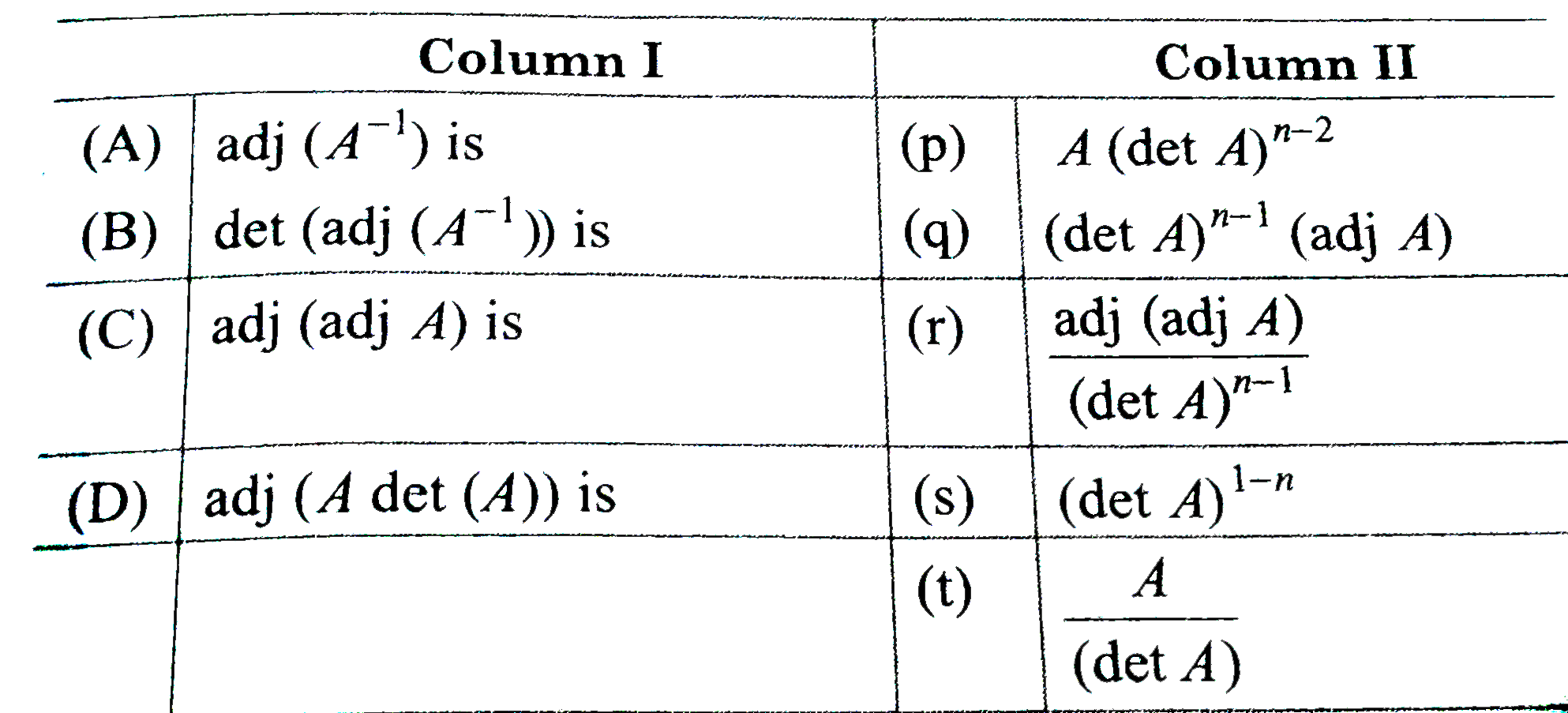Let A be an orthogonal non-singular matrix of order n, then |A−In| is equal to :
|In−A|
|A|
|A||In−A|
(−1)n|A||In−A|
The correct Answer is:C
To solve the problem, we need to find the determinant of the matrix A−In, where A is an orthogonal non-singular matrix of order n.
1. Understanding Orthogonal Matrices:
An orthogonal matrix A satisfies the property AAT=In, where AT is the transpose of A and In is the identity matrix of order n. This means that the columns (and rows) of A are orthonormal vectors.
2. Determinant of Orthogonal Matrices:
The determinant of an orthogonal matrix is either 1 or −1. Thus, we can write:
|A|=±1
3. Finding the Determinant of A−In:
We want to find |A−In|. To do this, we can use the property of determinants:
|A−In|=|A|⋅|In−AT|
Since A is orthogonal, we have |A|=±1.
4. Using the Property of Determinants:
We know that:
|In−AT|=|In−A|
because the determinant of a matrix and its transpose are equal, i.e., |B|=|BT|.
5. Final Expression:
Thus, we can express the determinant as:
|A−In|=|A|⋅|In−A|=±|In−A|
6. Conclusion:
Therefore, the determinant |A−In| is equal to |In−A| multiplied by either 1 or −1. However, the exact value depends on the specific orthogonal matrix A.
Final Result:
|A−In|=|In−A|
An orthogonal matrix A satisfies the property AAT=In, where AT is the transpose of A and In is the identity matrix of order n. This means that the columns (and rows) of A are orthonormal vectors.
The determinant of an orthogonal matrix is either 1 or −1. Thus, we can write:
|A|=±1
We want to find |A−In|. To do this, we can use the property of determinants:
|A−In|=|A|⋅|In−AT|
Since A is orthogonal, we have |A|=±1.
We know that:
|In−AT|=|In−A|
because the determinant of a matrix and its transpose are equal, i.e., |B|=|BT|.
Thus, we can express the determinant as:
|A−In|=|A|⋅|In−A|=±|In−A|
Therefore, the determinant |A−In| is equal to |In−A| multiplied by either 1 or −1. However, the exact value depends on the specific orthogonal matrix A.
|A−In|=|In−A|
Similar Questions
Knowledge Check
- Question 1 - Select One
Let A be orthogonal and non-singular matrix of order n, then the determinant of matrix (A−ln) is equal to
A|ln−A|B|A||ln−A|C|A|D(−1)n|A||ln−A| - Question 2 - Select One
If A is a non-singular matrix of order n, then A(adjA)=
AABIC|A|InD|A|2In - Question 3 - Select One
If A is a singular matrix of order n, then (adjA) is
AsymmetricBsingularCnon-singularDnot defined
If A is a non-singular matrix of order 3, then adj(adj(A)) is equal to
View SolutionIf A is a non-singular matrix of order n×n, then : |adj⋅A|=
View SolutionIf A is a singular matrix of order n, then A(adjA)=
View SolutionLet A be a non-singular square matrix of order 3×3. Then |adjA| is equal to
View SolutionIf A is a non-singular matrix of order 3, then ∣∣adjA3∣∣=
View Solution

